Sinclair Lewis
An American Classic
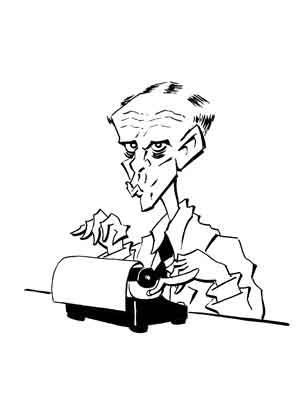
Sinclair Lewis
A Sudden Resurgence?
From 1901 to 1929 nine Americans won the Nobel Prize. The subjects ran the gamut from Peace to Physics to Chemistry to Physiology and Medicine. But none had won the prize for Literature.
But finally in 1930 an American was so honored. That was Sinclair Lewis and the award was granted "for his vigorous and graphic art of description and his ability to create, with wit and humour, new types of characters". Sinclair wrote over 20 novels, most of which few people read anymore.
Such a fate, alas, is not that uncommon for great writers. They still have their fans, of course, but how many people read Sherwood Anderson, Ford Maddox Ford, and Edward Benson? Or big name writers like Edna Ferber and John O'Hara? And even iconic writers, like Gertrude Stein or - dare we say it? - James Joyce?
This doesn't mean the writers were bad. Just that few people read them much anymore. Styles change, and so their once innovative and fresh prose ends up coming off as stiff and artificial. And now we have had the ultimate in style change where the Nobel Prize in Literature is going to songwriters.
Some critics grump that awarding the Literature Prize to a lyricist even though there isn't a Music/Lyrics Nobel Prize means people don't read books anymore. Not only have some celebrities have gone on record that they don't read books, but they are proud of not reading books. That includes, the ...
Well, we'll let that go for now.
Sinclair Lewis was born on February 7, 1885 in Sauk Center, Minnesota. His dad was a doctor, and after high school Sinclair went to Yale. He contributed to the Yale Literary Magazine and after graduating in 1908 with a degree in English, he worked as a journalist and editor, the later duties including occasionally sweeping up the office. Such, Sinclair said, shows the advantage of a university education.
In 1910, Sinclair began working for a publishing house in New York, and he also started out sending short stories to magazines. At that time reading short stories was like watching television is today. Sinclair enjoyed some success as a writer, but the first four novels he wrote, although published, weren't very successful.
Then in 1920 Sinclair published Main Street, about how life in small town America was far from the idyll that people liked to believe. The book was a major success by the standards of the day. Then with the publication of Babbit - a book about a man who achieved and was simultaneously dissatisfied with the American Dream - Sinclair hit the big time.
In 1926 Sinclair, now a major American author, published Arrowsmith. This was a book about a young medical doctor, Martin Arrowsmith, who we follow from his medical school days throughout his career. It's a good enough book, although some of the passages come off as a bit laughable. For instance, Martin's mentor, a famous researcher named Max Gottlieb, was a faculty member at a Midwestern college. As a tenured college professor, Max had the independence to pursue his research as he thought best and was particularly critical of the then burgeoning pharmaceutical companies that did their research for (ptui) money.
But Max's rigid mentality and unbending scientific honesty ran him afoul of the college administration. He was called before the Board of Regents of the university to answer charges drafted by the president. Standing before the Board, the president began:
These charges are: Disloyalty to his dean, his president, his regents and to the State of Winnemac [Sinclair didn't use the names of real states]. Disloyalty to recognized medical and scholastic ethics. Insane egotism. Atheism. Persistent failure to collaborate with his colleagues, and such inability to understand practical affairs as makes it dangerous to let him conduct the important laboratories and classes with which we have entrusted him. Gentlemen, I shall now prove each of these points, from Professor Gottlieb's own letters to Dean Silva.
Of course, Max was forced to resign. To make a living Max swallowed is pride and called up a pharmaceutical company. The Representative called him with an offer:
Well, we shall be glad to offer you five thousand dollars a year [a good sum in 1926] .... We'll give you all the space and technicians and material you need, and you just go ahead and ignore us, and work out whatever seems important to you. Our only request is that if you do find any serums which are of real value to the world, we shall have the privilege of manufacturing them, and if we lose money on 'em, it doesn't matter [emphasis added]. We like to make money, if we can do it honestly, but our chief purpose is to serve mankind [emphasis added]. Of course if the serums pay, we shall be only too delighted to give you a generous commission.
Obviously this company was also fictional.
Sinclair's last big hit - perhaps his biggest hit - was Elmer Gantry in 1927. This was about a hypocritical minister who liked to make whoopee in his off hours. As in Arrowsmith, we follow Elmer through his college days. Elmer first attended the non-existent Terwillinger College, located in equally non-existent Gritzmacher Springs in (the real state of) Kansas. Abandoning a career in law, Elmer attended the (fictional) Mizpah Theological Seminary in some undesignated state. We then follow Elmer throughout his career as a successful and sleazy evangelical preacher.
The book was widely praised or condemned depending on whether the reviewer considered Elmer to be a candid look at a type of hypocrisy that - as news stories show - is still with us, or if it was a disrespectful sneer at American's purported Christian Values. The book was, in fact, banned in Boston and was one of the books denounced in the sermon of Father Shannon in James Farrell's novel Studs Lonigan. To be fair, in the real world neither Elmer nor any of Sinclair's other books appeared on the Index of Prohibited Books of the Catholic Church. And to be even more honest, Simone de Beauvoir's book, The Second Sex, and all of the works of Jean Paul Satre, were on the list.
Some of Sinclair's books were also made into movies. Main Street, Babbit, Mantrap, Ann Vickers, and Arrowsmith all appeared on celluloid. Some other movies were based on his novels or short stories but were retitled by Hollywood. In 1997 Arrowsmith was made into a television mini-series.
But certainly the most successful movie from Sinclair's books was the 1960 release of Elmer Gantry which starred Bert Lancaster. Although a good enough movie, it takes liberties with the plot and characterizations, probably to deflect some of the criticism that hit the book.
It was three years after Elmer Gantry was published that Sinclair won the Nobel Prize. The other Prize winners were Chandrasekhara Raman (Physics), Hans Fischer (Chemistry), Karl Landsteiner (Physiology and Medicine), and Lars Söderblom (Peace). There was no Nobel Prize for Economics then - and strictly speaking - there isn't one now.
As people got tired of reading about insecure Americans, Sinclair's later books waned in popularity. All in all he published more than 20 novels, over 70 short stories, and various articles on topics of interest. By the end of the 1930's Sinclair was as much a cultural figure as he was a famous writer.
Sinclair's second wife, Dorothy Thompson, first met him at a party in Moscow where he had drunk so much he passed out on a sofa. She later saw him again in 1927 in Berlin right after Elmer Gantry had been published. Sinclair again had too much to drink, but for some reason Dorothy found him appealing. They married the next year.
Dorothy was a celebrity author and journalist in her own right. She interviewed Hitler in 1931 and wrote about how dangerous it would be for someone like him to come to power. At that time, the idea that Hitler would ever hold office was routinely dismissed. After all, Maria Schicklgruber's grandson had never yet held elected office and had been only good at gathering groups of sycophantic and xenophobic violent rabble rouses around him. In fact, throughout his life Hitler never held any elected office. When he came to power as Chancellor in 1933, he was appointed.
Sinclair died on January 10, 1951 at age 65. For the time that was a fairly ripe old age, particularly for someone who smoked like a chimney and drank like a fish - again habits that were common for the time.
Compared to some novels of the era - The Great Gatsby, The Sun Also Rises - Sinclair's writing can seem stiff and the characters stereotypical. So today much of his writings come off almost as pastiche and unintentional satire. But as we said, Sinclair still has his fans. His books, they say, invented the stereotypes. To criticize his style is like criticizing Shakespeare's plays as being nothing but a bunch of quotations.
Recently, though, there was an upsurge in the sale of one of Sinclair's books. This was It Can't Happen Here, published in 1935. We read how a popular albeit fictional political candidate Berzelius "Buzz" Windrip is elected president by appealing to the prejudices against the established old fuddy-duddy politicians. Catering to the hatred toward minority groups and fear of - quote - "anti-American" ideologies - unquote - when he was unexpectedly elected, Buzz promptly sets up a dictatorship.
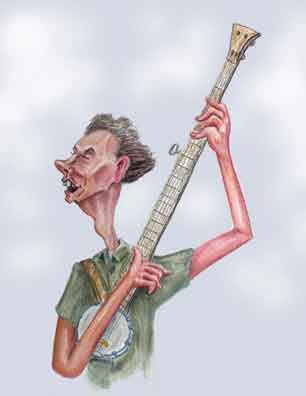
Pete Seeger ...
The immediate inspiration for the book was the rise of Huey Long, the flamboyant populist governor and later senator from Louisiana. Huey's opponents accused him of running Louisiana like a dictator, and his supposed intent to run for President added fuel to the fire that he wanted to set up totalitarianism in America. However, it's not likely that Huey would have done so, and the truth was he had relatively little support outside Louisiana. We should also remember some people said Franklin Roosevelt was assuming near dictatorial powers in the 1930's when he began rolling out the New Deal.
Franklin did not, as we know, establish a dictatorship, but he sometimes seemed to have worried about things that you'd think a President didn't have time to worry about. He once heard an album recorded by an anti-establishment folk song group called the Almanac Singers and wondered if the singers could be thrown in jail. This does seem out of character as Franklin never had a reputation for having a particularly thin skin. Eleanor also heard the songs, and although she thought they were clever said they were in bad taste. The Almanac Singers, by the way, included both Woody Guthrie and Peter Seeger, although Woody did not sing on this particular album. Franklin, of course, did nothing to the Almanac Singers.
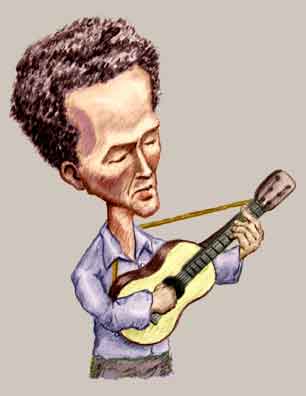
... and Woody
Franklin thought about it.
It Can't Happen Here enjoyed moderate success and generally favorable reviews. However, we read that the book recently sold out from a popular bookselling website. Sold out or not, there are still places you can buy the book fairly cheaply, particularly if you want later reprints and not a pristine first edition. A quick check does indicate the prices have risen, no doubt as a testament to the reality of the law of supply and demand.
Interestingly, a reading of the book illustrates an unusual facet of dictatorships that is often lost. Regardless of whether they are right or left, Communist or anti-Communist, all dictatorships have to have an economically socialistic basis. This does not mean, of course, that all governments with strong socialistic characteristics are necessarily dictatorships. Those who assert such are committing what logicians call the fallacy of the undistributed middle.
Certainly some of Buzz's promises sound a lot like old-school socialism even though Buzz's platform also made advocating socialism high treason. Buzz promised $5000 (the same as Max Gottlieb's salary) to everyone and so he was offering the famous "Guaranteed Annual Wage" of the more optimistic socialist platforms.
Actually a guaranteed wage is something few countries ever implement although it has been part of the platform of some US presidential candidates. Senator George McGovern, the Democratic candidate of the 1972 presidential election, had a guaranteed wage proposal that was soundly trashed by supporters of his opponent Richard Nixon. If nothing else, this shows how supporters of candidates don't really listen to what their own candidates say. Dick had a program for a guaranteed wage, too.
In the novel Buzz mandated all finance would be controlled by the government and all natural resources and associated businesses would be nationalized. He then decreed that the businesses would be freed of all government regulations.
Buzz also put limits on maximum wages. No one could make above $500,000 a year. Americans of African descent fared worse and got whacked with a 100% tax of all of their earnings above $10,000. They would also be stripped of their rights and limited to low paying jobs. Also Buzz decreed that women would work only in proper female jobs - hairdresser and the like - and should concentrate on running the home.
All armed services would be expanded. Finally Congress would pass amendments to give the president full power to act without Congressional approval and would then continue to serve only in an advisory capacity.
Buzz organized "marching clubs - just for the campaign, of course. But they became a bit more permanent after the election. He called these clubs "Minute Men", and he made sure they didn't have distinctive colors to the uniform. That allowed him to say, "Black shirts? Brown shirts? Red shirts? Yes, and maybe cow-brindle shirts! All these degenerate European uniforms of tyranny! No sir! The Minute Men are not Fascist or Communist or anything at all but plain Democratic - the knight-champions of the rights of the Forgotten Men - the shock troops of Freedom!" He later sent them in to break up rallies - and the heads - of his opponents.
The Minute Men were also put in charge of fulfilling the promise of $5000 a year. It turns out the campaign promise was modified so that the money would be paid when finances permitted. While waiting for the improved finances, though, the poor were put in work camps where they had to pay for room and board. Of course, after the election Buzz puts his political opponent, Doremus Jessup, in jail.
You may have heard one of Sinclair's most famous quotes: "When Fascism comes to America, it will be wrapped in the flag and carrying a cross". Alas, as famous as the quote is, Sinclair neither said nor wrote this pithy saying.
But in It Can't Happen Here, Doremus does muse something similar although more secular. "But he saw too that in America the struggle was befogged by the fact that the worst Fascists were they who disowned the word 'Fascism'".
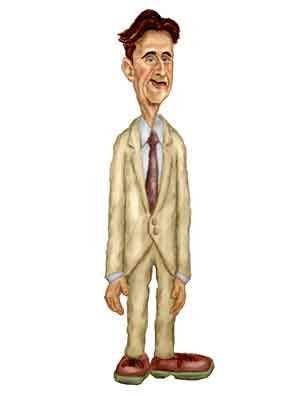
George Orwell
He riled people.
Eventually in a political or ideological discussion you can bet someone will accuse an opponent of being fascist or a Nazi. The ubiquity of the epithet was possible because almost immediately after World War II the word "fascism" quickly lost any meaning beyond "something not desirable". George Orwell pointed this out in his famous 1946 essay "Politics and the English Language". Conversely George pointed out that the word "democracy" had also lost meaning beyond a vague word of praise.
The tendency for people advocating fascist philosophies to disavow the system was also noted by British poet Derek Stanley Savage when responding to another essay by George. During World War II, George had raised the ire of pacifists when he, George, wrote an essay where he said that pacifists were hindering the war effort. And anything that hindered the war helped the other side. Ergo, said George, pacifists were "objectively pro-Fascists".
Naturally George's essay brought spittle-flinging replies from a number of pacifists. The responses were not only from Derek, but also from Alex Comfort, M. D. Yes, this was the same Alex Comfort, M. D., who in the 1970's made a bundle when he wrote a famous and lavishly illustrated "how-to" book on "how-to". Alex, Derek, and Canada's George Woodcock wrote letters in protest that were published with an individual reply from Orwell.
But it was in his own letter that Derek had written with some degree of choler:
Don't let us be misled by names. Fascism is quite capable of calling itself democracy or even Socialism [George's favored form of government]. It's the reality under the name that matters.
George himself was once asked by a reader why some countries - like Great Britain and America - have managed to put workable democracies into place while other countries with equally democratic sounding laws and guarantees of civil rights can't shake the totalitarian mode. George said he thought it was a matter of tradition. Democratic institutions had been evolving in England over centuries, and so the tradition naturally was carried on by its American colonies.
That democracies can become dictatorships has much historical precedence. Ancient Athens tended to flip-flop between tyranny to oligarchies to democracies with surprising ease. The Roman Republic morphed into the Imperial System in the space of a few decades. And the Wiemar Republic was transformed nearly instantaneously to the Third Reich with the election of 1932.
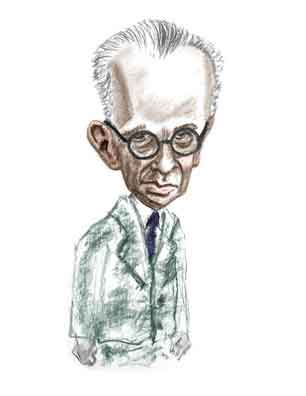
Kurt Godel
He said it could happen.
We might also want to remember the story about Kurt Gödel, who is often cited as one of the most important mathematicians in history. Kurt was born in what is now the Czech Republic and grew up in Vienna. Finding himself a citizen of a Nazi regime after the Anschluss, he left Austria and became an American citizen.
When he was studying for his citizenship exam, he was aghast when his quick grasp of logic allowed him to deduce that the Constitution would permit American democracy to be legally transformed into totalitarianism. That caused him a bit of trouble when the examining judge asked him why he had wished to become an American citizen. Kurt said he wanted to live in a free society, and his own country had been transformed into a dictatorship. "Which of course," the judge said, "can't happen here." Kurt leapt up and cried, "Oh, but you're wrong!" Fortunately, the judge went on and granted Kurt his citizenship.
A quick way to produce a dictatorship is to declare a national emergency which permits establishment of martial law. Then once the democratic institutions are suspended you just don't bring them back.
Although the US Constitution does not mention martial law, there are two clauses that the courts - the Supreme Court actually - say permit the president or Congress to declare it. Martial law was declared nationwide only during the Civil War. The declaration was by President Lincoln, not Congress.
However, various state or territorial governors have declared martial law at one time or another. If martial law is declared, the head of the government can scrap habeas corpus and replace civil courts by military tribunals where the normal rules of evidence are suspended.
Ultimately, though, the courts have the final say if a declaration of martial law is valid and have tended to insure martial law is a short term situation. There have been cases where the Supreme Court ruled an imposition of martial law was invalid because there were fully functional civilian courts in operation.
You do wonder, though, what would happen if we ever have a presidential candidate who during his campaign said he would ignore a Supreme Court ruling and then he actually got elected.
But that, of course, can't happen here.
References
Sinclair Lewis: Rebel from Main Street, Richard R. Lingeman, Random House, 2002.
Sinclair Lewis: An American Life, Mark Schorer, McGraw-Hill, 1961.
Nobel Prize Winners of the World, Prateeksha Tiwari, Diamond Pocket Books, 2009.
"Sinclair Lewis", Sinclair Lewis Nobel Prize Biography, 1930.
What America Read: Taste, Class, and the Novel, 1920-1960, Gordon Hutner, The University of North Carolina Press, 2009.
"Sinclair Lewis Novel 'It Can't Happen Here' Sells Out Online", Kerry Close, Money, November 16, 2016
"So Where's Sinclair?, National Public Radio, A Prairie Home Companion. An interesting post as the question posted by a fan of Sinclair asks where has he gone? The answer was mainly people didn't read him anymore. The post has recently disappeared.
Woody Guthrie: A Life, Joe Klein, Knopf, 1980.
"Martial Law", West's Encyclopedia of American Law, the Gale Group, 2005.
Sinclair Lewis Society, https://english.illinoisstate.edu/sinclairlewis/. Sponsored by the English Department of Illinois State University.
Who Got Einstein's Office? Eccentricity and Genius at the Institute for Advanced Study, Edward Regis, Perseus Books (1987). The first chapter is about Kurt and arguably is the best chapter of the book.
"Free Press", Chicago Daily Tribune, April 18, 1927, p. 10, c. 1.
"Dorothy Thompson", John Simkin, Spartacus Educational, 2014.
The Collected Essays, Journalism and Letters of George Orwell. Volume 3: As I Please 1943-1945, George Orwell, Harcourt, Brace, 1968.
"Sinclair Lewis", Internet Movie Data Base.
"Songs for John Doe", The Almanac Singers, 1941.